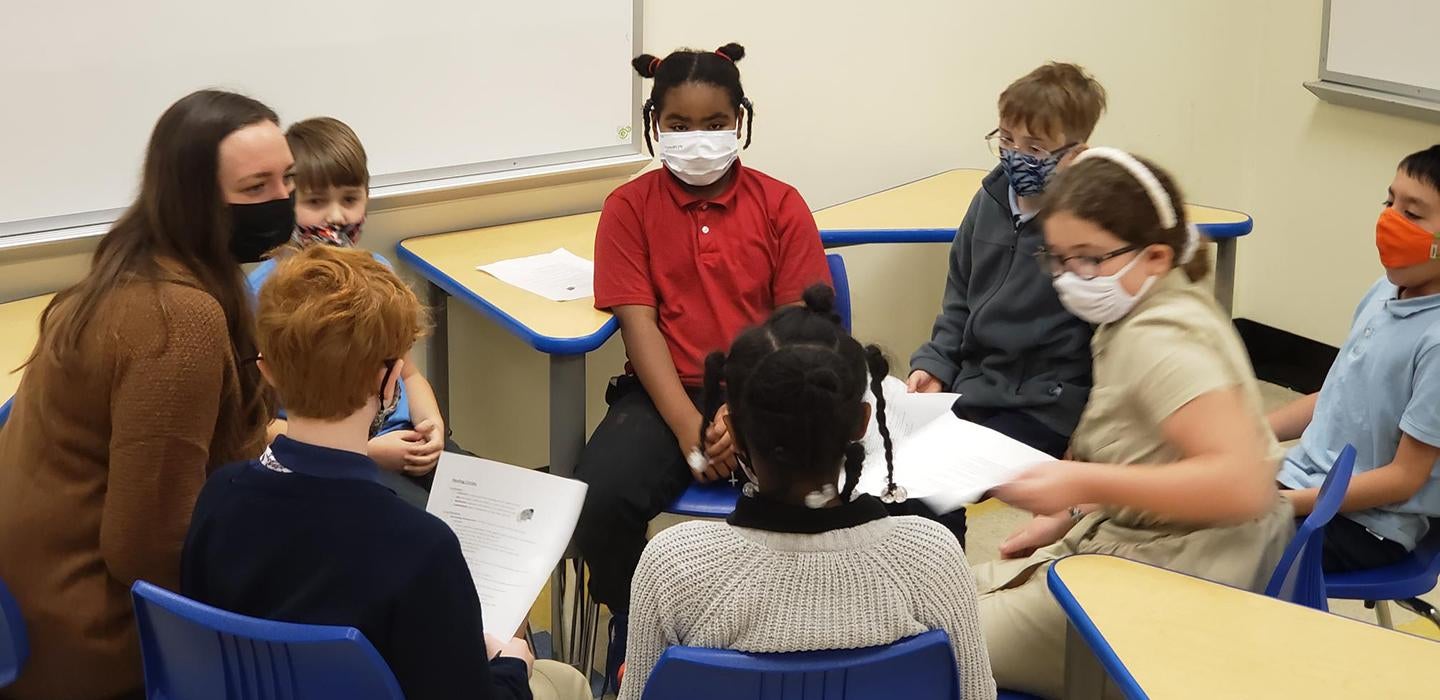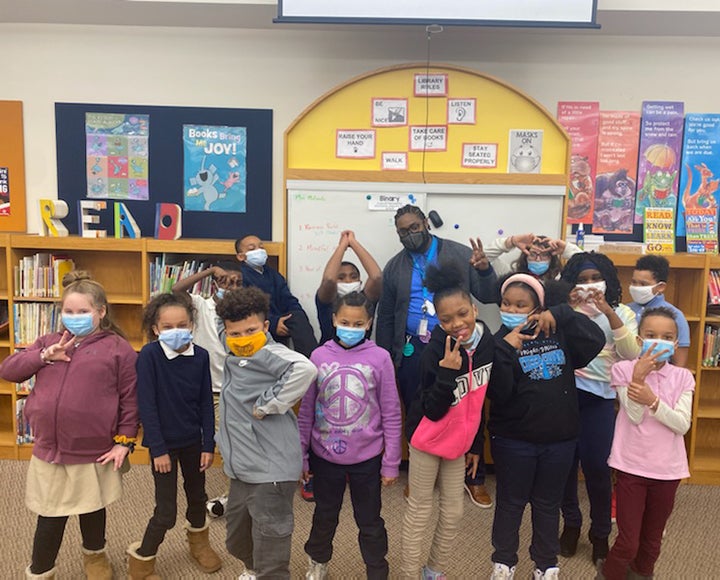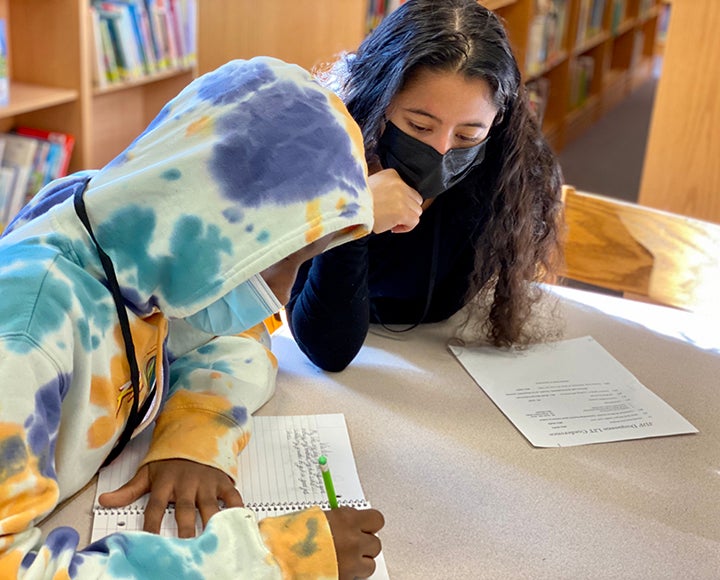
Subscribe to Pittwire Today
Get the most interesting and important stories from the University of Pittsburgh.Two Pitt professors have received additional funding to expand the Just Discipline Project, which aims to address disparities in suspension rates for Black and brown students in the region.
Through evaluating and enhancing elementary school environments with tailored programming and training for students, teachers and administrators, the hands-on program seeks to eliminate traditional disciplinary practices that have created inequity in schools and caused a surge in the school-to-prison pipeline.
“We want to get to the root of the issues,” said Ming-Te Wang, professor of psychology and education in the School of Education and Learning Research and Development Center and co-lead on the project. “We’re trying to figure out how to make the school community more optimal, supportive and accommodating for kids regardless of their background and help teachers evaluate how to be more culturally responsive.”
Just Discipline will expand to include 12 more Pennsylvania schools this fall and another 8 next year, supported by a $4 million grant from the U.S. Department of Education, $3 million from the Institute for Educational Science, and locally by The Heinz Endowments and The Pittsburgh Study at Children’s Hospital.
The funding boost will help Wang and fellow co-lead James Huguley, associate dean and associate professor in the School of Social Work, replicate the work that began in the Woodland Hills School District in 2017.
“Our population was in dire need,” said Leah Kelly, a teacher in Woodland Hills Intermediate, the first Just Discipline site. Now a special education teacher in new program affiliated Edgewood Elementary, she said the program improved communications across the board.
“Working with the Justice Discipline team, we saw a major change,” said Kelly. “Suspension numbers came down; we had more time for academics and relationship building with a happier population. The environment became a more positive place to work and learn. It’s a resource I cannot speak highly enough of that brought us amazing partners from the University of Pittsburgh who [are] now permanent members of our Woodland Hills family. We are forever grateful for them and what they’ve taught us.”
A vital aspect of the program is providing full-time staff and resources to assist with relational and behavioral issues. This includes a restorative practice coordinator who works daily alongside teachers, training them on cultural competency and developing community-building activities.
-
-
“It’s well-documented in research that use of exclusionary school discipline is harmful to the kids that receive it, and that those who receive it most are Black, Latinx kids from disadvantaged economic backgrounds and LGBTQ kids,” said Huguley. “Teachers are often overstretched with all the pressures in education, under-resourcing in urban schools or the lack of mental health and counseling supports and basic extracurricular needs. Even well-meaning teachers don’t have all the necessary resources to respond to their students.”
The program also creates opportunities for students, granting many the chance to learn leadership and mediation skills.
“It’s about building a climate where students feel they belong, are cared for and ensuring structures within the building let that happen,” Huguley said. “There’s no lack of talent, no lack of ability, only a lack of opportunity and justice. When you trace back histories, you see the societal forces that have worked against the Black community, and education is one manifestation of that, for sure.”
From friendship to collaboration
Wang and Huguley have drawn from their own backgrounds for the project.
“I grew up attending urban public schools,” said Huguley, who was raised in a low-income neighborhood in Providence, Rhode Island. “I was a kid from the projects. It was your typical urban school, except for a gifted and talented program [with] white kids from more affluent families and communities. They were in this bubble, and I was in that bubble with them. I saw the difference between what I was experiencing and what my peers from my community and others like mine were getting in the mainstream.”
Participation in that advanced program set him on the fast-track to success. He attended Providence College and later Harvard University. But even at that level, some things didn’t change.
“When I got to college, I looked around and didn't see people like me, Black and brown and I wondered why,” Huguley said.
Wanting to replicate his elementary school opportunity for others, he sought out programs designed to uplift Black and brown kids and fell into teaching.
Wang, meanwhile, found his desire to fight disparities in his role as a counselor and English teacher in the Tung-Fu Middle School in Taiwan. He likened the environment to that of Indigenous reservations in the U.S. — a place designed “to retain cultures that’s endured historical struggles and structural barriers.”
He noted that disparities resulted in students’ disinterest in education.
“That got me thinking about how we can better engage students in everyday schooling. I'd been focused on counseling, helping kids but wanted to promote systemic change to alter an environment, structural areas versus just looking at individuals,” Wang said.
-
-
The following year, he enrolled in Harvard University to pursue a doctorate in human development and psychology, and that’s where he met Huguley, who was working toward a master’s in education and risk prevention. They shared an advisor and often collaborated on small projects, becoming friends.
Wang arrived at Pitt in 2012, the same year he and Huguley published a paper on racial socialization and Black kids’ academic achievement —a nod to their future collaboration. Huguley joined Pitt the following year.
Backed by Pitt’s Center on Race and Social Problems and Motivation Center, the duo reunited in 2017 to conduct a study that revealed that 73% of Allegheny County school districts had suspension rates for Black students at least doubling the rate of their non-Black counterparts.
Their analysis suggested severe regional racial discrepancies directly tied to the school-to-prison pipeline, which is when disciplinary experiences in school increase students’ likelihood of interaction with the juvenile justice system. Their response was to create Just Discipline.
Despite their track record of fruitful collaborations, Wang and Huguley attribute their success to their growing team which includes other Pitt people: program director Shawn Thomas, director of operations Michele Leyshon, research coordinator Rachelle Haynik and multiple restorative practice coordinators.
Engagements with the Equity Initiative, Pennsylvania state legislators ors and invitations from the U.S. Commission on Civil Rights to speak, are proof that the Just Discipline staff are meeting a national need.
“We’re’ trying to demonstrate a different way, because these trends are pretty consistent across the country,” said Huguley. “We want people to know there are better, more humane ways.”
Wang added, “We want to convince policymakers that instead of investing money in purchasing more metal detectors, we should try something different. We want to generate compelling evidence to advocate for this program and teacher education.”
— Kara Henderson
Photographed at top: Restorative Practice Coordinator Michele Snyder leads a group activity and discussion at Turtle Creek K-5 Steam Academy. (Photos courtesy of Huguley)




